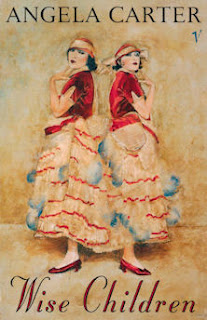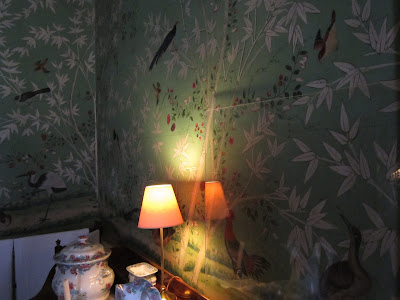Although I've read a few Shaw plays, I don't think I've ever seen one performed. This one would be great fun to watch, although it is apparently rarely performed in its entirety. There are four acts - Acts 1, 2, and 4 are set in upper-class society with Shauvian topics of marriage and left-wing morals. Act 3, normally excised, is... set in hell. As you do. But I won't jump the gun - let's rewind back to Act 1.
Ann has recently lost her father, and is waiting to hear whom her father appointed her guardian (for, although her mother is still alive, she seems fairly useless). Most likely candidate is Roebuck Ramsden, a no-nonsense, traditional sort of chap, whose chief horror is the spectre of Socialism. Said spectre is represented by Tanner, something of a pessimist but rather a wordy, witty one. To Ramsden's horror, Tanner and he have been chosen to be co-guardians. Tanner sees through Ann's guise of unworldly innocence, to the determined young woman inside:
A man who certainly does not see through this guise is poor hapless Octavius. He's very sweet, but utterly besotted with Ann and incapable of seeing her faults, even when Tanner points them out to him. Especially then. And we're all set up for a lovely comedy of manners, with some handy dichotomies thrown in: right-wing/left-wing, conventional/'advanced', romantic/cynical, serious/playful. Being Shaw, it's not quite as insouciantly blithe as it would be in the hands of some playwrights. He gets his politics in - gently, in the first two acts, in the linguistic tussles of Ramsden and Tanner, which are great fun.She'll commit every crime a respectable woman can; and she'll justify every one of them by saying that it was the wish of her guardians. She'll put everything on us; and we shall have no more control over her than a couple of mice over a cat.
The big moral quandary comes in with Ann's sister Violet, who (we find out) is pregnant. Ramsden and Octavius are horrified, while Tanner congratulates her on her progressive nature. All is not quite what it seems, and it's a rather clever bit of playing with a common early-20th century dilemma.
Then Act 3. Which is set in Hell, and features Don Juan, a statue, and the Devil (amongst others). This act is almost invariably omitted from productions of Man and Superman, and one can see why. Shaw intends to draw parallels between these characters and those of the play proper - indeed, the play started in response to the challenge to write one in the tradition of Don Juan - but it's all a little heavy-handed (as Shaw can be) and probably rather costly to stage. The Devil is not an unsympathetic character, and has very advanced views on warfare, considering this is pre-WW1:
On and on this act goes, until eventually - with an intellectually improved audience, I daresay, but also a rather bored and confused one - we return to the characters we know and love, and witty wordplay becomes, once more, the order of the way.In a battle two bodies of men shoot at one another with bullets and explosive shells until one boy runs away, when the others chase the fugitives on horseback and cut them to pieces as they fly. And this, the chronicle concludes, shews the greatness and majesty of empires, and the littleness of the vanquished. Over such battles the people run about the streets yelling with delight, and egg their governments on to spend hundreds of millions of money in the slaughter, whilst the strongest Ministers dare not spend an extra penny in the pound against poverty and pestilence through which they themselves daily walk.
And Shaw is witty! He doesn't specialise in those twisty, meaningless bon mots of Oscar Wilde, which are so clever and a little wearing (except in the incomparable Importance of Being Earnest) but a more extended pattern to his writing. Wilde relies on the epigrammatic individual line; Shaw's paragraphs flow, with ingenious pacing and regulated logic, and produce humour that way. Just as an example, here are Tanner's thoughts on marriage:
Man and Superman ended up not being useful for my chapter, but it was great fun to read. I think I might return to Shaw's plays in December, if the 1900s and 1910s are still proving tricky years to fill...Marriage is to me apostasy, profanation of the sanctuary of my soul, violation of my manhood, sale of my birthright, shameful surrender, ignominious capitulation, acceptance of defeat. I shall decay like a thing that has served its purpose and is done with; I shall change from a man with a future to a man with a past; I shall see in the greasy eyes of all the other husbands their relief at the arrival of a new prisoner to share their ignominy.
And what happened to Ramsden, Ann, Violet, Tanner, Octavius and all? I bet you can guess at least one outcome...













































